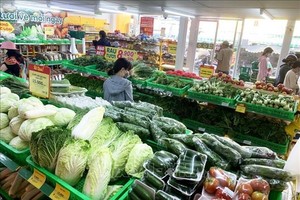
The country’s retail commerce growth is expected to reach 11.9 percent a year in the phase of 2016-2020 with the market size approximating US$179 billion by 2020, according to Commerce Research Institute.6
Britain Euromonitor forecast that by 2020 foreign retailers will occupy 68.3 percent of modern retail market share in Vietnam.
Director general of a leading food producer says that Saigon Co.op and other retailers in Vietnam are gradually losing their competitive ability. Vietnamese supermarkets have proved to be falling into disfavour compared to foreign ones such as Aeon, E-mart, Lotte Mart and Mega Market.
For the last two years, Saigon Co.op has opened few new supermarkets and just focused on convenient stores. Still Co.op Food stores have slowly developed compared to rookie Bach Hoa Xanh.
Domestic retail firms now comprise Saigon Co.op with Co.opmart supermarkets, Co.opFood, Co.op Smile, Co.opXtra and Sense City; VinGroup with Vinmart supermarkets, Vinmart+ and VinPro; Saigon Trading Group with SatraFood, Satramart and one commerce center; The Gio Di Dong with Bach Hoa Xanh stores and Dong Hung Company with Citimart supermarkets and stores.
So far, Saigon Co.op has kept leading supermarket trading field. Vingroup’s strength is not retail but real estate. Similarly, retail is not the main business of Satra so Satrafood brand name has been faint in the market.
Newcomer Bach Hoa Xanh has not been strong enough to impact the market. In addition, the store chain has conducted initial public offering and sold shares to foreign investment funds.
Citimart has sold 40 percent of its shares to Aeon. Only Saigon Co.op is purely Vietnamese.
While foreign firms are moving forward to develop supermarkets and trade centers through new investment projects and Mergers and Acquisitions deals, domestic companies have just concentrated in convenient stores.
An unnamed market expert said that even the country’s leading retailer Saigon Co.op has showed signs of slowing down with only few new supermarkets being opened for the last two years.
In fact, Saigon Co.op has yet to solve big problems in both trading and organization. It has been out of date for the system to switch its operation model according to Cooperative Law 2012 . Therefore, it is still unclear that Saigon Co.op is a cooperative or a business.
Being a cooperative, Saigon Co.op has to establish a consumer cooperative because its scope has reached 16,000 people excluding two millions of familiar customers. If maintaining the model of a cooperative, Saigon Co.op needs the attendance of millions of customers to establish the consumer cooperative. Cooperative members will create the system a new force, which its rivals cannot have.
Some experts said that after Metro and Big-C met with some legal problems in transferring their shares to foreign partners, it was golden time for Saigon Co.op to speed up investment in supermarket segment, which is its strength. Still the system has not taken advantage of that and left behind by rivals.
























